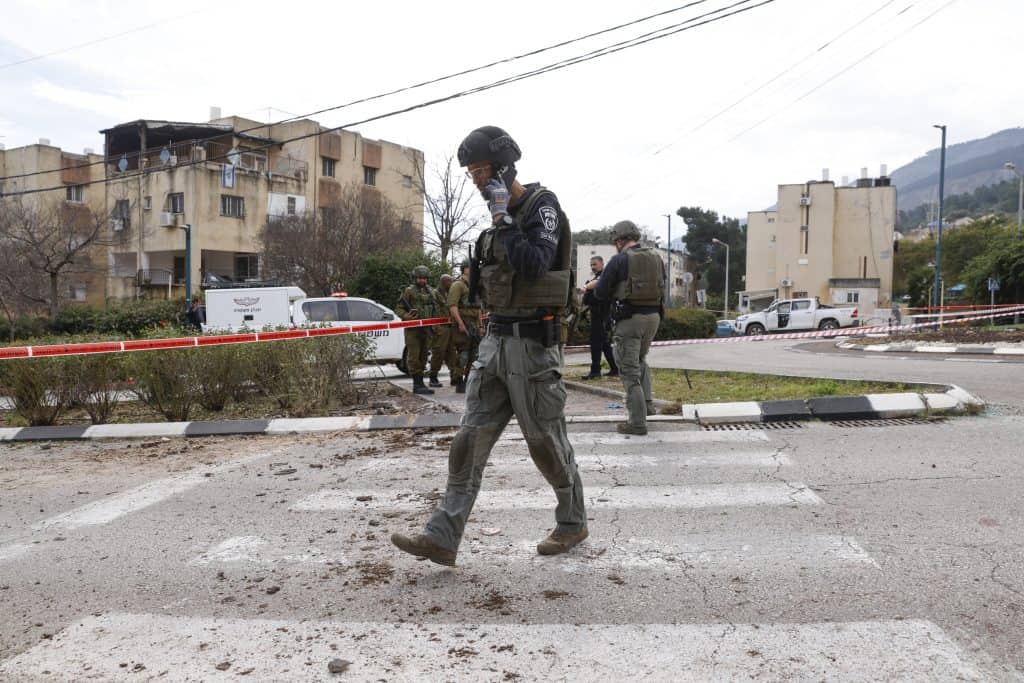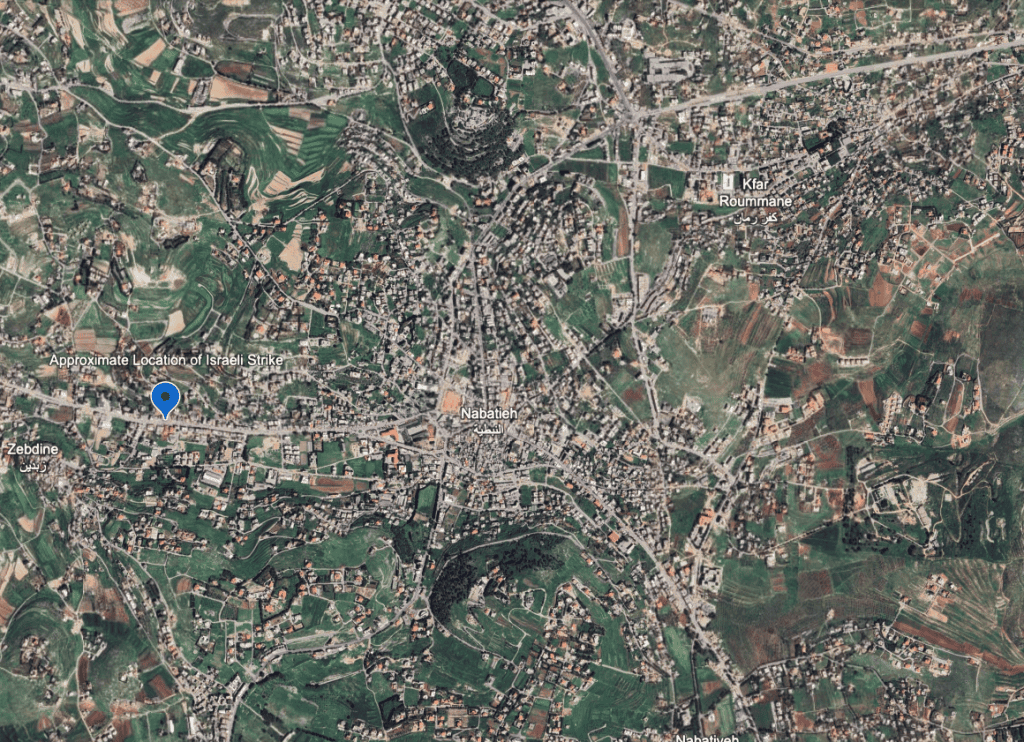
Last Thursday, Israel reportedly attempted to assassinate two high-ranking Hezbollah members: Ali Karaki, identified by media outlets as a “Hezbollah military commander” but, more significantly, “the general military commander of Hezbollah” and “the highest-ranking military command personality in the Hezb[ollah], and a member of its Jihad Council,” which oversees the group’s whole military apparatus; and Abbas al-Debes, a Radwan Force regional commander based in Nabatiyeh. For the details of what is known about that attack, see this previous report in FDD’s Long War Journal.
A curious silence surrounds the attack, which seemingly was a response to a Hezbollah strike on an IDF HQ near Kiryat Shmona. If one were monitoring any of Hezbollah’s radio, media, or print outlets that day or since, it’s as if the attack didn’t occur at all. Al-Manar’s correspondent in south Lebanon even reported on the presence of the Israeli drones that carried out the attack just minutes before it occurred but suddenly went silent on that issue after its execution – even as he, like Hezbollah’s other outlets, continued to report on other developments. Hezbollah was equally mum about the intended targets of the attack – whose identities were culled from other Lebanese and foreign media outlets – as well as their fates. It was reported by those non-Hezbollah outlets that Karaki had escaped the car before the strike and was not hit at all and that Al-Debes – initially reported as killed – may have been seriously injured and also may have undergone successful surgery.
Hezbollah has continued with this virtual silence, with few exceptions. Later that day, it claimed to have fired a Falaq-1 missile at the IDF’s air traffic control base in Meron at 7:30 PM “in retaliation for the Zionist aggression…on Nabitieh,” and once again at 11:00 PM claimed to have fired “dozens of Katyusha rockets” at an IDF base in Ein Zeitim, also “particularly in response to the recent aggression on Nabatieh.” Hezbollah’s Left-Progressive oriented mouthpiece Al-Akhbar also acknowledged that the strike had occurred, calling it a “serious escalation” and “new expansion,” but did not provide any further details, neither confirming nor denying the alleged identities of the strike’s target nor their fates.
Hezbollah’s silence has been by design. Commenting on the strike in Nabatieh for the first time, Hezbollah Secretary-General Hassan Nasrallah on Tuesday rebuked his followers for offering details on the strike or its targets on social media or to media outlets. “You’re offering free information to the Israelis,” he said. “When we go on social media and saying So-and-So [was hurt or killed]…what are we doing? What are we offering to Israel? If you want to send the brother well-wishes, call him and say so. Don’t put on social media who was martyred, his rank, or the degree of his wounds. The Israelis are looking for that. We didn’t comment [for a reason]. We can release statements [but] it’s not appropriate, it’s not appropriate.”
The Israelis were equally cagey. Despite the IDF issuing a statement acknowledging a “strike on the launchpad from which [rockets] were fired at Kiryat Shmona,” no official mention was made of the strike in Nabatieh. Israel Air Force Commander Maj. Gen. Tomer Bar also issued a veiled threat against Hezbollah but did not claim the strike earlier that day.
Today, the barrage of rockets fired from south Lebanon has been equally shrouded in mystery, and perhaps deliberately so. At 9:04 AM, Israel’s Red Alert sirens began sounding in the Galilee, with alerts going off for Safed – 13 km from the Lebanon border – at 9:05 AM and 9:17 AM. Based on Israeli media reports, this consisted of a barrage of 11 Grad rockets. Nine rockets slammed into open areas. Two of the Grads, which the Iron Dome did not intercept, struck infrastructure inside the city, including one that hit an IDF base, killing one soldier and wounding eight others – one in serious condition, another in moderate condition, and the others sustaining light wounds.
Separately, Hezbollah announced that three fighters had been killed today, but did provide details about their deaths. The group stated they perished “on the road to Jerusalem,” a phrase that Hezbollah has adopted to infer that they died fighting Israel.
In the intervening days between the original strike on Nabatieh and the rocket attack on Safed, Israel followed up with another strike in the Nabatieh District on Friday, an attempted assassination of a Hamas official Bassel Saleh near Sidon, close to 60 km from the Israeli border on Saturday, and then on Sunday, Lebanese media reported that an Israeli drone targeted a vehicle in the nearby town of Bint Jbeil, which was carrying Mohammed Alawiya, a senior Hezbollah member responsible for the Maroun El Ras region. According to Lebanese media, Alawiya was injured but survived the strike.
Hezbollah’s media outlets reported on the Safed strike but only quoted reports from their Israeli counterparts. Al-Mayadeen was an exception, reporting several rocket attacks from Lebanon into various points in northern Israel, but from 9:22 AM-12:07 PM, which explains how the Grads could bypass Iron Dome to strike the base in Safed: Hezbollah fired other rockets and projectiles to confuse the system, and amidst that fired a directed barrage at Safed. But, Al-Mayadeen never mentioned the party responsible for the attack. Al-Manar correspondent Ali Choeib only dropped a hint of Hezbollah’s responsibility.
Hezbollah itself, however, issued no statement on the attack or claim of responsibility, and unidentified “informed sources” soon told Lebanese outlet Elnashra that Hezbollah wasn’t responsible for today’s attack on Safed, but that “[another] party was responsible for the strike.” The same source posed the question, “who said the strike originated in south Lebanon at all? And who specified whether the strike on the Israeli base happened with missiles or drones?” Despite this facetiousness, Hezbollah remains the party most likely responsible for today’s strike, and this media game was all perhaps in obedience to Nasrallah’s instructions given on Tuesday.
With equal reticence, Israel soon began an initial aerial bombardment of several targets in south Lebanon that killed one, but perhaps two, Hezbollah fighters, and Israeli aircraft were hovering over Beirut. Two hours later, Israeli drones fired two missiles at an apartment in a three-story residential building in the city of Nabatieh’s Hay al-Maslakh — located on Marjayoun Street near Palestine Gas Station and Ali Jaber Motorbike Dealership – which, according to the latest reports, has killed eight people – who preliminary reports identified as a civilian family – and sent five wounded to a hospital. Lebanese news outlet Lebanon Debate reported, based on preliminary information, that the strike had “targeted a high-ranking Hezbollah official.”

Approximate Location of Israel’s 02/14/2024 Strike in Nabatiyeh
A war has been raging between Hezbollah and Israel since October 8. It is a low-intensity war of attrition, but a war nonetheless. But the mutual attacks on high-value targets coupled with mutual silence suggests Israel and Hezbollah are engaging in a parallel shadow war as well, one with higher stakes for each side. It remains to be seen whether this parallel undeclared conflict will bleed into the more apparent one, and whether or not it will lead to its exacerbation.
What is certain is that Hezbollah’s ongoing attacks against Israel since October 8 have thrown the previously well-defined “rules of the game” between both sides and their redlines into flux. Both Hezbollah and Israel are now trying to take advantage of that fluidity to set new rules on what attacks are acceptable, where, and against whom – with each side perhaps trying to position itself to strike more painful blows at its adversary the day after a ceasefire is declared along the Blue Line. That is, unless this current and ongoing daily exchange of fire spirals into a much broader war.







